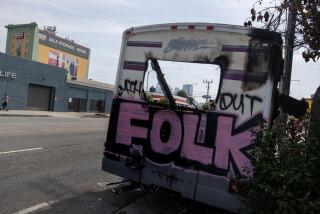Editorial: Living in an RV isn’t ideal, but a crackdown is cruel
Here in the nation’s least affordable rental market, the poor often have to come up with creative ways to keep a roof over their heads. One of those ways is to live in a motor home or RV.
During the last homeless count, volunteers counted 2,363 campers in the city of Los Angeles that had been turned into makeshift dwellings. That number has been rising steadily in recent years, along with the rise in homelessness. Last week, KPCC showed just how ordinary the practice has become, reporting that some enterprising landlords have begun buying RVs at impound lots in order to rent them for $200 to $1,000 or more a month. Others have bought box trucks or other vehicles and rented those as homes too.
Los Angeles City Councilman Mitch Englander thinks this is an outrage. He said last week that he wants the city to regulate or ban people from renting out vehicles to be used as dwellings, which he calls a “predatory practice” that exploits homeless people. He also recently asked the city to consider further restrictions or to enact an outright ban on RV parking on public streets.
These are not normal times. We are in housing crisis that is fueling a homelessness crisis. There are few vacancies in Los Angeles and rents have skyrocketed.
Of course, in normal times, no one would want to let thousands of people live in RVs on the streets. Just as we don’t want people living in cars. A vehicle is not a home, and there are sanitation issues, public health issues and quality of life issues that arise when people live in vehicles on the street.
But these are not normal times. We are in a housing crisis that is fueling a homelessness crisis. There are few vacancies in Los Angeles and rents have skyrocketed. When the median rent for a studio apartment in the city of Los Angeles is more than $1,900 and the wage needed to afford that rent, by most calculations, is more than $30 an hour, it should be no surprise that there are people living in vehicles.
So, yeah, it’s far from ideal that people are renting RVs and other vehicles as housing of last resort. And certainly, if a vehicle is violating parking rules, dumping sewage or posing a fire risk — by all means, the city should take action and even confiscate the vehicle if it is a danger.
But to criminalize the entire practice or to impose rental standards on vehicles as if they were houses or to ban camper parking throughout the city ignores the reality of the moment and effectively pushes homeless people out of their vehicles and onto the streets. How is that humane?
If council members were really worried about the safety and security of people living in cars and RVs, they’d have developed Safe Parking locations in their districts already. Last year — in response to a U.S. 9th Circuit Court of Appeals decision striking down the city’s ban on sleeping in vehicles — the City Council adopted a law that barred people from sleeping overnight in vehicles near homes, parks and schools, but allowed them to do so in industrial or commercial districts.
At the time, Mayor Eric Garcetti and council members touted Safe Parking programs as the compassionate response to the crackdown on people living in vehicles. The idea was that people could park their cars or campers for the night in the parking lots of churches, nonprofits and public agencies. They would have access to restrooms and be provided with security guards and connected with homeless service providers. At these safe parking areas, city officials, caseworkers and others could work with vehicle dwellers to curtail unsafe conditions and try to get people into stable housing.
A year later, though, there is just one, small safe parking lot in the city, at a church in South Los Angeles. As usual, Los Angeles leaders are quick to pass restrictions and much slower to provide solutions.
Los Angeles city and county voters have committed to a multibillion-dollar program to provide homeless services and housing. There will, we hope, be a day when Los Angeles can legitimately say that there are enough social services, enough housing for homeless people, and enough affordable housing units that people living on the margins have real choices other than to sleep in their vehicles. But that time has not arrived. And to crack down on vehicle dwellers before that time is cruel.
Follow the Opinion section on Twitter @latimesopinion and Facebook
More to Read
A cure for the common opinion
Get thought-provoking perspectives with our weekly newsletter.
You may occasionally receive promotional content from the Los Angeles Times.


![Los Angeles, CA - May 19: Carlos Vargas, left, and Paulina Rubio, members of the harm reduction team from Homeless Outreach Program Integrated Care Systems [HOPICS], a leading homeless services and housing agency, look for drug addicts to help and pass out supplies at a homeless RV encampment along 77th St. in South Los Angeles Friday, May 19, 2023. The team hands out syringes, fentanyl test strips, overdose reversal nose spray and medication to prevent overdoses, infection and disease transmission, including the HIV virus. Fenanyl is particularly insidious because it can be found in all other drugs, especially meth and heroin. The handouts are also meant to reduce infection through broken pipes, which can cut users mouths and open them to infection. . (Allen J. Schaben / Los Angeles Times)](https://ca-times.brightspotcdn.com/dims4/default/530e2db/2147483647/strip/true/crop/3900x2608+0+34/resize/320x214!/quality/75/?url=https%3A%2F%2Fcalifornia-times-brightspot.s3.amazonaws.com%2Fe9%2F77%2F4b8bd35d4881a3edec6b945b143b%2F1298639-me-soaring-fentanyl-deaths-24-1-ajs.jpg)







